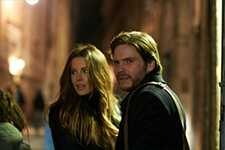The Face of an Angel
|  The Face of an Angel is built on the intriguing idea of using a thinly fictionalized version of the notorious Amanda Knox trial to explore how real-life events are transformed into art, but the resulting film—which is itself the very thing it’s ostensibly exploring—gets muddy and misguided very quickly. Director Michael Winterbottom is no stranger to feature films based on ripped-from-the-headlines reality—his filmography includes A Mighty Heart (2008) based on the kidnapping and beheading of Wall Street Journalist reporter Daniel Pearl by Islamic terrorists; Road to Guantanamo (2006), a mix of documentary and drama about the holding of three British Muslims at Guantanamo Bay; and Welcome to Sarajevo (1997), a drama set against the backdrop of the Bosnian War—or metafiction, which he had previously played for comedy in Tristram Shandy: A Cock and Bull Story (2005) and The Trip (2010). Yet, in The Face of an Angel he never seems to get a full handle on how the story and characters and themes all connect, which results in a mess of a movie—an intriguing mess, but a mess all the same. The Face of an Angel is built on the intriguing idea of using a thinly fictionalized version of the notorious Amanda Knox trial to explore how real-life events are transformed into art, but the resulting film—which is itself the very thing it’s ostensibly exploring—gets muddy and misguided very quickly. Director Michael Winterbottom is no stranger to feature films based on ripped-from-the-headlines reality—his filmography includes A Mighty Heart (2008) based on the kidnapping and beheading of Wall Street Journalist reporter Daniel Pearl by Islamic terrorists; Road to Guantanamo (2006), a mix of documentary and drama about the holding of three British Muslims at Guantanamo Bay; and Welcome to Sarajevo (1997), a drama set against the backdrop of the Bosnian War—or metafiction, which he had previously played for comedy in Tristram Shandy: A Cock and Bull Story (2005) and The Trip (2010). Yet, in The Face of an Angel he never seems to get a full handle on how the story and characters and themes all connect, which results in a mess of a movie—an intriguing mess, but a mess all the same.All of the names have been changed, but the backstory in The Face of an Angel is clearly that of Amanda Knox, the American exchange student in Italy who was convicted of murdering her British roommate in 2007 and then acquitted four years later. Amanda becomes Jessica Fuller (Genevieve Gaunt), while the victim, Meredith Kercher, becomes Elizabeth Pryce (Sai Bennett), both of whom are seen primarily in gauzy flashbacks that are meant to create direct contrast between the ideals of youth, beauty, and vitality and the brutal nature of murder. Paul Viragh’s screenplay, which is ostensibly based on Barbie Latza Nadeau’s Angel Face: Sex, Murder, and the Inside Story of Amanda Knox, sets up a dichotomy between Thomas (Daniel Brühl), a filmmaker who has been sent to Siena, Italy, to observe the trial as material for what his financial backers assume will be a can’t-lose true-crime thriller, and Simone Ford (Kate Beckinsale), a journalist who has written a book about the murder and becomes Thomas’s ally and adversary. Thomas wants to create art out of the sordid real-life mess; fueled by his reading of Dante’s The Divine Comedy, he becomes intent on creating a “medieval morality play,” as one character calls it, in which the details of the case are but fodder for an esoteric examination of the slippery nature of truth. Simone and the other writers covering the case, most of whom are depicted as soulless denizens of tabloid journalism, are simply interested in the salacious details of sex and violence—the more scandalous the better, of course. Thomas is increasingly disgusted by such attitudes, and so, by proxy, should we. But, Thomas turns out to be such an unattractive protagonist that it feels unseemly to identify with his concerns, however legitimate they may be. It is established early on that Thomas is struggling in life: his career is sinking, he is separated from his successful actress wife, and his only real lifeline is his preadolescent daughter Bea (Ava Acres), with whom he can connect only briefly via Skype. Brühl is an excellent actor, but here he is left to convey Thomas’s artistic and personal difficulties via a lot of moping and snorting cocaine, which quickly becomes tiresome. Winterbottom generates some tension via his involvement with Edoardo (Valerio Mastandrea), a local who Thomas begins to suspect was involved in the murder, if not directly responsible for it. But much of that tension simply dissipates, despite the inclusion of genuinely weird and unsettling nightmares that merge Thomas’s various anxieties, the facts of the case, and Dante’s Inferno. Eventually the film attempts to find solace by pairing Thomas in a strictly plutonic relationship with Melanie (Cara Delevingne), a pretty young barmaid whose youth and vitality are not marred by tragedy and violence, which allows her to become a kind of saving grace for Thomas. Unfortunately, by that point we aren’t involved enough in Thomas’s morose moral and artistic battles to care much, even when it appears that the forces of banality have won yet again. Copyright ©2015 James Kendrick Thoughts? E-mail James Kendrick All images copyright © Screen Media Films |
Overall Rating: 
 (2)
(2)


